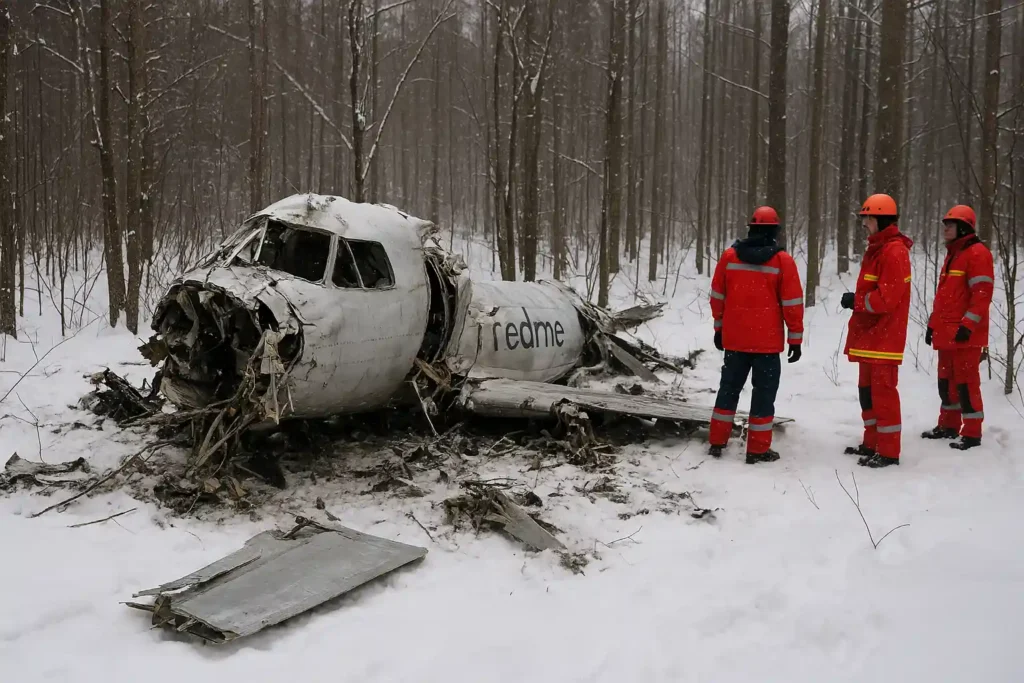A recent Russian plane crash has once again brought global attention to air safety standards and the challenges faced in remote areas. The incident occurred in the vast Siberian region, where a passenger aircraft operated by Angara Airlines reportedly crashed during its flight, killing multiple people onboard.
Contents
What Happened?
According to initial reports, the aircraft—an older Antonov An-24 model—was carrying a mix of passengers and crew members on a regional route when it suddenly disappeared from radar. After hours of search efforts, the wreckage of the Russian plane was discovered in a forested area near Irkutsk, confirming the worst fears.
Local emergency services and aviation officials rushed to the scene, navigating through difficult terrain and harsh weather. Rescue teams have since recovered bodies and black box recorders, which are now being analyzed to determine the cause of the crash.
“The plane went off the radar shortly after takeoff. There were no distress signals received,” said a spokesperson from Russia’s Ministry of Emergency Situations.
The Victims
The flight reportedly had around 30 people onboard, including crew. While some sources initially held out hope for survivors, the harsh crash site conditions and extent of the damage made survival unlikely. Families are now left waiting for official identification of the victims.
The tragedy is particularly hard-hitting because it involved a domestic route that many locals depend on due to the limited transport infrastructure in Siberia. Small regional planes like the An-24 are lifelines in these remote parts of Russia.
Possible Causes of the Crash
While the investigation is still underway, experts suspect a mix of mechanical failure and possibly bad weather. The An-24 is a Soviet-era aircraft that has been in service since the 1960s. Though it’s been updated over the years, many aviation analysts believe these older aircraft should have been retired long ago.
This crash raises questions about Russia’s aviation safety, especially for smaller airlines operating older fleets in less accessible areas. Angara Airlines, though regionally trusted, has been criticized before for maintaining outdated planes.
According to a BBC report, Russia has had a worrying number of aviation incidents in recent years, especially involving older aircraft. This latest crash only adds fuel to the debate about regulation and fleet upgrades.
Global Reaction and Condolences
As news of the Russian plane crash broke, messages of sympathy started pouring in from around the world. Governments and civil aviation authorities expressed condolences and offered assistance if needed.
Back home, President Putin called for a full-scale investigation, demanding transparency and accountability from both the airline and regulators. He also instructed regional officials to ensure that the victims’ families are supported financially and emotionally.
Russia’s History of Plane Crashes
Sadly, this is not an isolated incident. Russia has a long and troubled history when it comes to aviation safety. Just last year, another Russian passenger plane crashed in the Far East, and a similar tragedy happened in 2021 involving an An-26 aircraft.
While major international airlines operating from Russia, such as Aeroflot, follow modern safety protocols, many regional carriers still rely on older planes and operate in tough environments.
A report by The Aviation Herald shows that while Russia’s overall aviation fatality rate has improved in recent years, it still lags behind global averages—especially for domestic or remote flights.
Moving Forward: Will Anything Change?
This latest crash could become a turning point. Already, Russian aviation authorities are hinting at new regulations requiring the retirement of aircraft older than 40 years and pushing for better training programs for pilots in remote areas.
There is also growing public pressure to modernize regional fleets, invest in safer navigation systems, and improve runway conditions in remote airports.
For now, the focus remains on recovering all victims and uncovering the truth behind the crash. But many Russians are hoping this will be more than just another headline—and instead spark real change.

